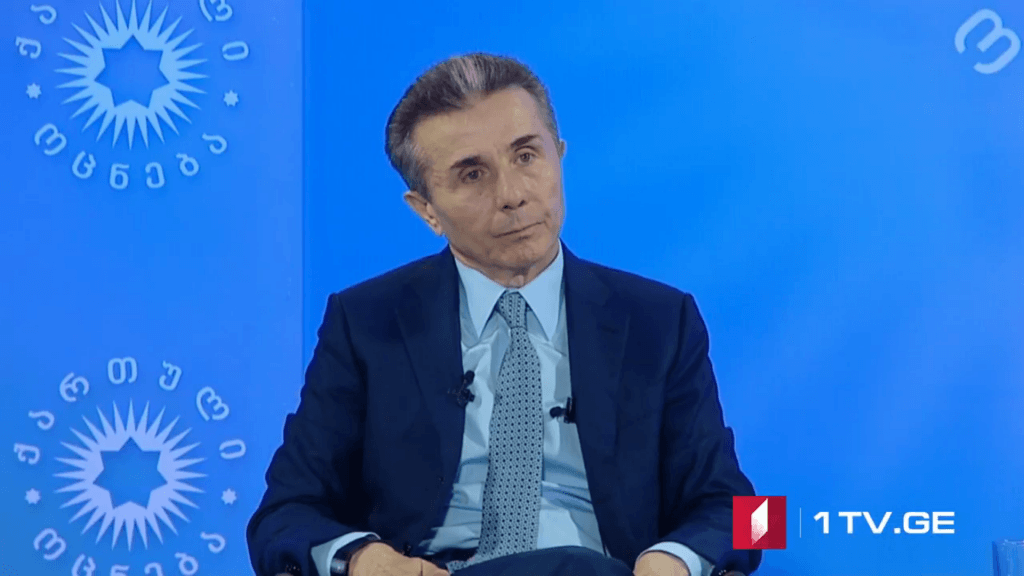Former Prime Minister Bidzina Ivanishvili continues his interviews with national broadcasters. This time, Ivanishvili was answering the questions of four television stations – Maestro, Iberia TV, PalitraNews and Obieqtivi.
The interview was recorded on October 26, two days after Ivanishvili’s first pre-election interview with three leading outlets. TV Kavkasia and Rustavi 2 were also invited for the interview, but the broadcasters turned down the proposal. Iberia TV rejected the request as well, but their journalist attended the interview in his individual capacity.
Better management for the ruling party
Like in the previous interview, Ivanishvili touched upon his reasons for returning to the helm of the ruling party, as well as his plans for strengthening the Georgian Dream-Democratic Georgia.
“Running the country through democratic means is extremely difficult and it requires a very strong team, and in the [previous] government the vertical [of power] was very weak … the team was no longer able to govern [with democratic means], because governing with democratic rules is extremely difficult in a poor country,” he said.
“Democratic governance requires a very strong vertical [of power], very good management, better selection of team leaders, better division of functions, and better synchronization within the team,” the GDDG leader added.
Ivanishvili then detailed his party reform plans, saying the GDDG “which is practically inactive [now],” will be filled with “absolutely new faces in one year’s time, will be reinforced with strong individuals and improved with better management.”
“By strengthening the vertical, the feelings in the public that some people can question the integrity of our state and turn the situation upside down will disappear,” he added.
He also pledged to increase the effectiveness of state institutions, including through “providing consultations” from GDDG’s thematic councils. Ivanishvili, however, reassured that this would happen through consultations only, and not through him being “a boss.”
Rustavi 2 airs ‘biased’ information
Ivanishvili repeated his criticism of Rustavi 2 TV, a national broadcaster leaning strongly towards the opposition. He said the TV channel propagates “lies” and “biased” information.
“The media is entitled and obliged to scrutinize and be critical towards the authorities, and of course, the government head, the parliament chairman or the party leader should have immediate reaction to corruption allegations, but Rustavi 2 does the opposite – it has failed to fulfil its function and it is exactly the working manner of Rustavi 2 that has enabled some [corrupt] officials to cover up [their crimes],” he said.
Ivanishvili then said freedom of speech and media, “the government’s main achievement,” will be guaranteed by the authorities, but added that the party “will spare no efforts to give everything its due name – to identify what is a lie and to respond to what’s correct criticism.”
UNM ‘divides, antagonizes’ society
He also slammed the opposition United National Movement, saying the party represents “a destructive” political force, which “does everything to divide and antagonize the society.”
Ivanishvili touched upon the secret audio tape allegedly featuring a conversation of ex-President Mikheil Saakashvili and his uncle Temur Alasania, a former UN official, where the latter is heard saying that he is willing to pay 1 million for assassinating the GDDG leader.
Ivanishvili said he cannot trust the veracity of the recording until its authenticity is officially confirmed, but stressed “there is no question that they are capable of doing that.” “Pardon me, but they have no guts for that; it is not so easy to assassinate me,” Ivanishvili noted.
“They were able to materialize that only when they were united as a wolfpack, when they had the entire state apparatus … but rest assured they won’t be able to do that [now],” he added.
He also suggested that the ongoing protest led by Zaza Saralidze, father of one of the teenagers murdered in controversial Khorava Street stabbing last December, was “politicized” and led by the United National Movement.
CSOs damaging the country’s interests
Ivanishvili repeated his criticism of the civil society organizations, saying some CSO groups “have a claim that they can say whatever they want without arguments and accuse the authorities, and when they are answered, present it as an attack against the civil society.”
The GDDG leader spoke at length about Eka Gigauri, executive director of the Transparency International Georgia, identifying her as “the leader and the coordinator” of the civil society groups, and accusing her of acting under UNM instructions.
“I have pointed to her several times that it would be good for her to leave the [civil society] sector, as her presence does no good for the civil society sector,” he stressed, adding that Gigauri’s statements have been “damaging” the country domestically and internationally.
Ivanishvili then stressed there is evidence that Gigauri, as then official in the Interior Ministry (Gigauri served as the deputy head of the border police in 2005-2008), authorized bonus payments to riot police officers who took part in dispersal of the opposition rally on November 7, 2007.
“That she took part in crackdown of a [peaceful] demonstration on November 7, makes her presence inadmissible, because this harms the civil society sector,” the GDDG leader noted.
This post is also available in: ქართული (Georgian) Русский (Russian)

